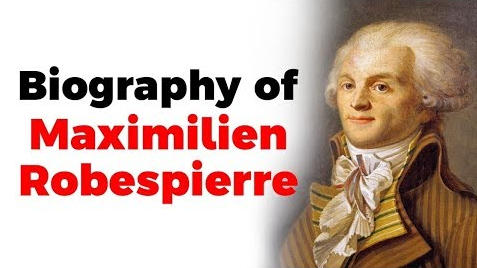Table of Contents
EARLY LIFE
- Maximilien Marie Isidore de Robespierre was born in Arras, France, on May 6, 1758, the oldest of four children. His mother died when he was 6 years old, and his father left the family soon after.
- The children were raised by their maternal grandparents. Young Maximilien was educated in Paris, graduating from the Lycée Louis-le-Grand and earning a law degree in 1781. He practiced law in Arras, which provided him with a comfortable income.
RISING
- Robespierre soon took on a public role, calling for political change in the French monarchy. He became a devotee of social philosopher Jean-Jacques Rousseau, intrigued by the idea of a virtuous man who stands alone accompanied only by his conscience.
- He gained a reputation for defending the poorest of society and earned the nickname “the incorruptible” for his adherence to strict moral values
RISING
- At age 30, Robespierre was elected to the Estates General of the French legislature. He became increasingly popular with the people for his attacks on the French monarchy and his advocacy for democratic reforms.
- He also opposed the death penalty and slavery. Some of his colleagues saw his refusal to compromise and his rigid stand against all authority as extreme and impractical.
JACOBIANS
- In April 1789, Robespierre was elected president of the powerful Jacobin political faction. A year later, he participated in writing the Declaration of the Rights of Man and Citizen, the foundation of the French constitution.
- On July 27, 1793, Maximilien Robespierre was elected to the Committee of Public Safety, formed to oversee the government with virtual dictatorial control.
- In the next 11 months, 300,000 suspected enemies of the Revolution were arrested and more than 17,000 were executed, most by guillotine. In the orgy of bloodshed, Robespierre was able to eliminate many of his political opponents.
REIGN OF TERROR
- The Committee oversaw the Reign of Terror. “During the Reign of Terror, at least 300,000 suspects were arrested; 17,000 were officially executed, and perhaps 10,000 died in prison or without trial.”
- On 24 June, the convention adopted the first republican constitution of France, the French Constitution of 1793. It was ratified by public referendum, but never put into force.
- On 27 July 1793, Robespierre became part of the Committee of Public Safety.
DOWNFALL
- On 21 May 1794 the government decided that the Terror would be centralised, with almost all the tribunals in the provinces closed and all the trials held in Paris.
- On 10 June the Law of 22 Prairial was introduced without consultation from the Committee of General Security, which deepened the conflict between the committees and doubled the number of executions.
- On 3 July he left the Committee slamming the door and shouting “Then save the country without me”.For forty days – it seems – Robespierre rarely appeared in the Convention, but signed five decrees by the Committee of Public Safety, and continued his work with the police bureau till the end of June 1794.
DEATH
- By the summer of 1794, many in the Revolutionary government began to question his motives, as the country was no longer threatened by outside enemies. An awkward coalition of moderates and revolutionaries formed to oppose Robespierre and his followers.
- On July 27, 1794, Robespierre and many of his allies were arrested and taken to prison. The next day, he and 21 of his allies were executed at the guillotine.
Biography Free PDF






















 WhatsApp
WhatsApp